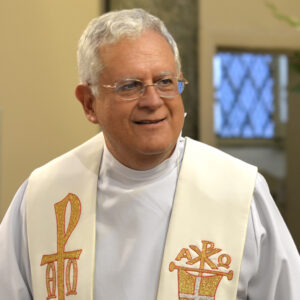Sunday Reflections
4th Sunday of Easter – May 11, 2025

Reflection by:
Fr. Paul Voisin, CR
Kite flying in Bermuda on Good Friday is a national activity. There is a story that the world-famous evangelist, Billy Graham, used to illustrate that God is with us, even when we are not aware of it. He preached, “There was a little boy out to fly a kite. It was a fine day, the wind was brisk, and large billowy clouds were blowing across the sky. The kite went up and up until it was entirely hidden by the clouds. A man passed by and asked, “What are you doing?” The boy replied, “I’m flying a kite”. “Flying a kite?, the man said, “How can you be sure? I can’t see the kite.” “No”, said the boy, “I can’t see it, but every little while I feel a tug, so I know for sure that it’s there!”
Perhaps that story, and our gospel (John 10:27-30) are related in the sense that we, “as sheep” of the Lord Jesus, hear “the voice” of the Good Shepherd, but yet we do not see Him with our own eyes. Our experience tells us that even though we do not see Him, we feel His presence, and we “hear his voice” in our prayer, which helps us to “follow him“. Just like the man in the story did not see the kite, the boy assured him that it was up there, as he continued to feel the tug. We may not always feel that close presence of God, or easily distinguish His “voice“, but we know that He is there not only because of divine revelation, but because of our past experiences with God, when we have felt His ‘tug’. He continues to call us, even though we may not recognize His voice, or be attentive to it. He calls us because it is a call to union with him, and sharing in his life and the life of His flock, the Church.
The First Reading, from the Acts of the Apostles (13:14, 43-52), testifies to how Paul and Barnabas heard the voice of Jesus calling them, first of all to faith in Him and to be His disciples, and then to go out and share the Good News with others, to be apostles. They began preaching the Good News to their fellow Jews, but they did not recognize the voice of God speaking through the words of Paul and Barnabas. They were not open to the revelation of Jesus, crucified and risen. And so, Paul and Barnabas turned to the Gentiles – the non-believers in one God – and there they found a receptive audience. They had to make such a gigantic leap to first of all, believe in one God, and then to believe in Jesus. The grace of God was active, and the words of the messengers were inspiring, and so they came to embrace the new life of God revealed in Jesus Christ.
The Second Reading, from the Book of Revelation (7:9, 14b-17), speaks so beautifully to us about the faithful of God and the Lamb that sits on the throne – Jesus Christ. He is the one who “shelters us” and “shepherds” us. When we listen to Him He leads us to a deeper life in Him, and the life of grace.
In our human condition we sometimes ‘hear’, but do not ‘listen’. I have made this distinction before, because most of us have no problem with the ability to ‘hear’, but that does not mean that we ‘listen’ to what we hear. In this sense, ‘listen’ means that I acknowledge and follow what I ‘hear’.
In the gospel Jesus says that “My sheep hear my voice”. We may ‘hear’ him, but that does not mean that we are always ‘listening’. Our challenge is to admit that we need to listen to Jesus, that He is the Teacher, the Messiah, our Saviour. Too often we hold Jesus at a distance and want to do things our way, although intellectually we may say we follow Jesus. Sometimes we want to let Jesus into our lives – into our thoughts, feelings, words, actions, and decisions -but only partially, so that we remain in control. Like the sheep who becomes lost, from not listening to our shepherd, Jesus Christ, we too can easily stray from the ways of Jesus because we are not ‘listening’.
Jesus also says, “I know them.” These words are not only reassuring to us, but they imply a personal and intimate relationship with us. Just as Jesus had the ability – as God-made-man – to see beyond the externals (like with Zaccheus the tax collector, the adulterous woman, the Samaritan woman, and so many others in the gospels) He knows us through and through. He knows our intentions. He knows our struggles and our successes. He knows our highs and our lows. He knows us because He loves us, rather than He loves us because He knows us. By this I mean that His love is unconditional, and no matter what we do his love is still there, trying to call us back to faithfulness. Unfortunately, in our human condition we may stop loving someone because we ‘know’ them, and we do not like what we see and hear. If we allow God to be God we understand that his love is far greater, and his mercy extends to us without end.
Finally Jesus says that “they follow me”. He is acknowledging Himself as our Shepherd, and that He is calling us. He is definitely like that kite that is tugging our string to let us know He is there. He is, actually, bombarding us with graces so that we will ‘listen’ and follow. Our challenge is to ‘listen’ and to follow Him sincerely, not just when we want something from God – security at work, the health of a loved one, good marks on an exam. Following Jesus means making decisions and living a life that reflect that we know His voice, accept His love, and want to act in union with Him, and give witness that we are sheep of His flock, and that He is our Shepherd.
Today Jesus calls us to be attentive to His voice. He wants us to be one with Him as He is one with the Father. This can only come about my responding to that tug on our kite string, recognizing that He is present, ‘listening’ to His voice, and following Him.
Share This Post
More To Explore

6th Sunday in Ordinary Time – February 15, 2026
This week, animated by today’s readings, let us trust in the wisdom of God, and the presence of the Holy Spirit…

5th Sunday in Ordinary Time – February 8, 2026
We are called to lift up the lamp which God has given us… May our actions, powered by our ever-loving God, warm and protect all those in affliction.
